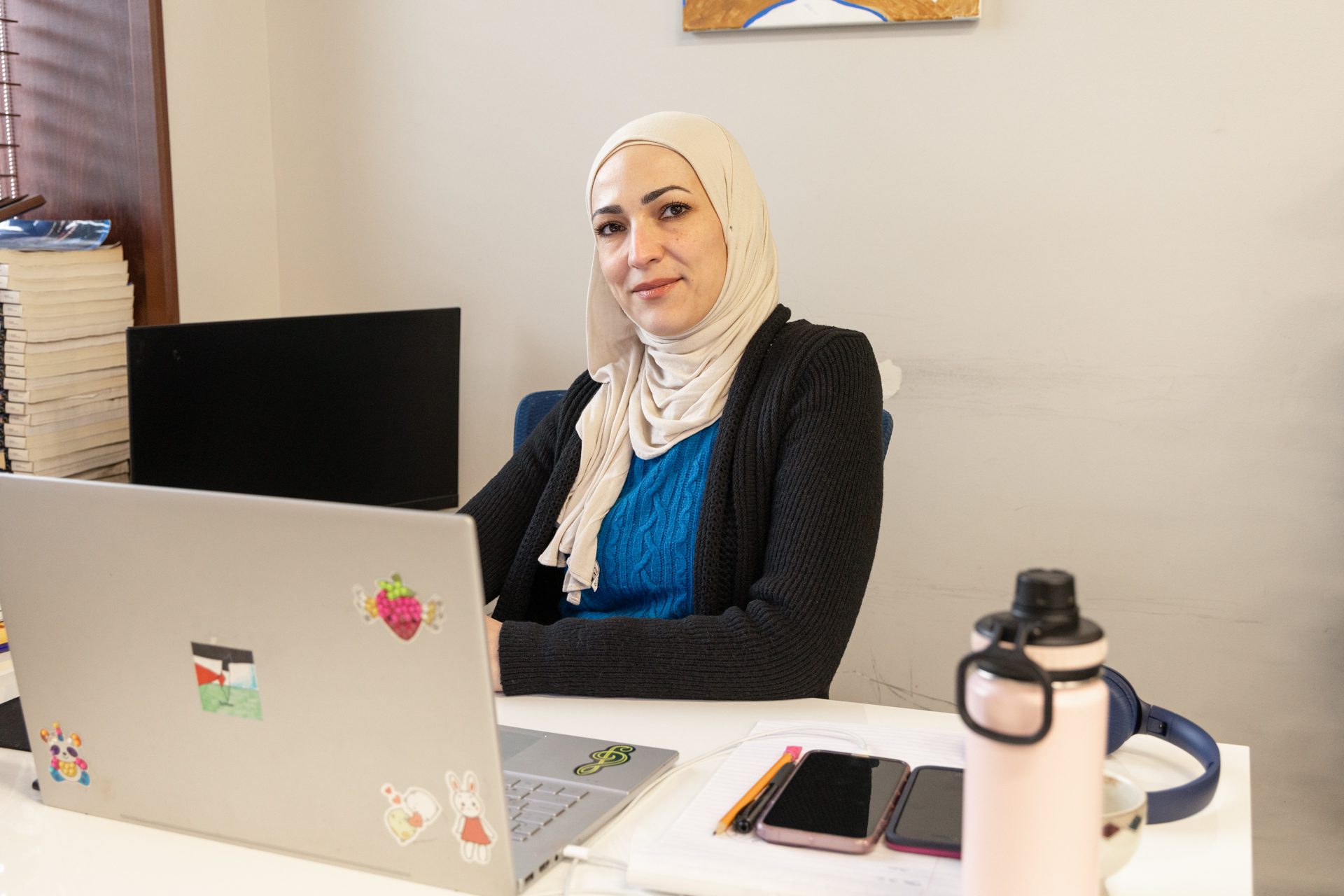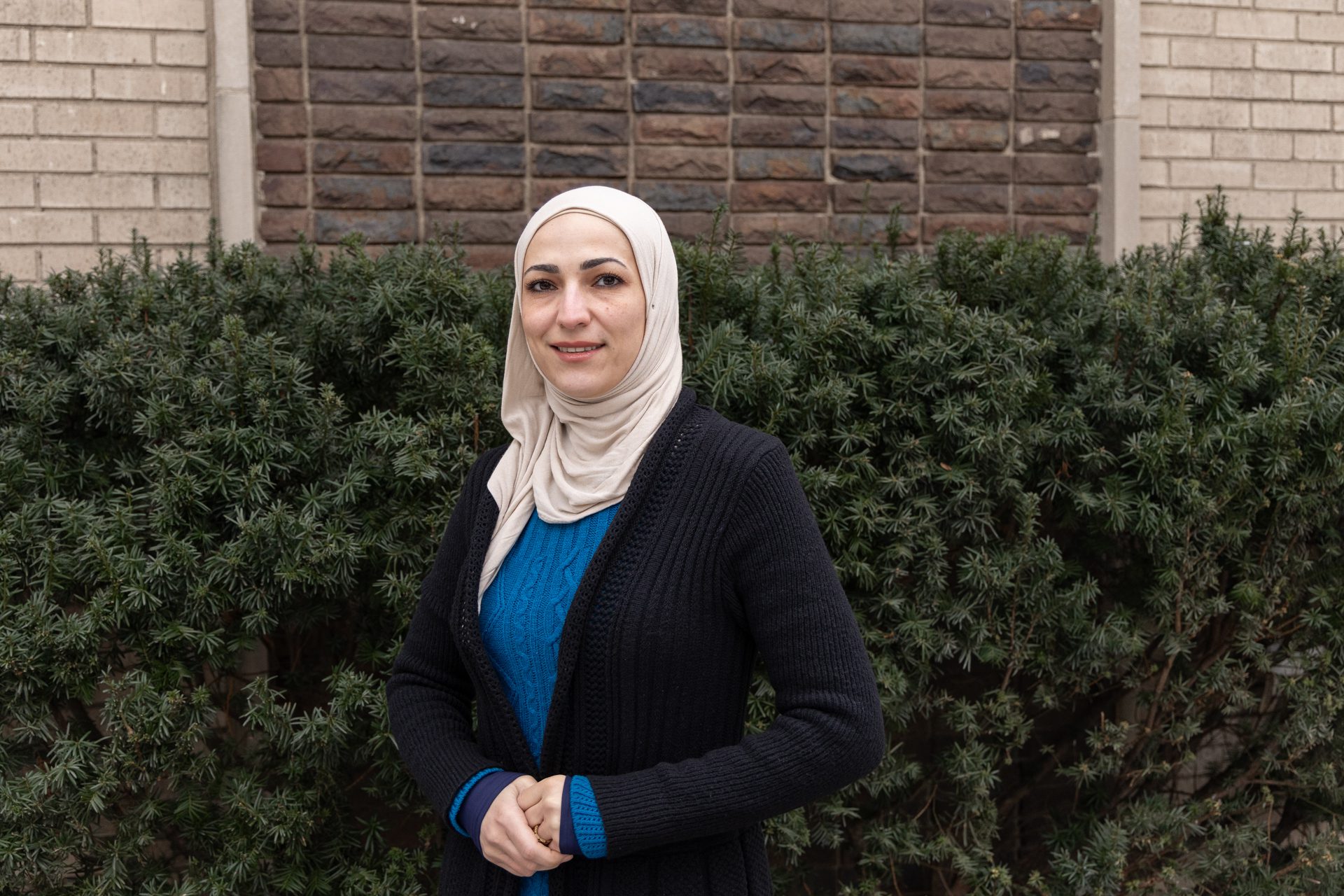 Oscar Gomez/Borderless Magazine
Oscar Gomez/Borderless MagazineAfter years of turmoil, Syrian refugees find hope in the wake of a regime change, but face new challenges under recently inaugurated President Trump.
Samira Alhamwi spent years losing hope that Syria would ever be free.
Since arriving as a refugee in Chicago, she would awake every morning filled with anxiety for her home country and loved ones living under an oppressive regime.
“Is my family okay? Are my brothers okay?” she worried.
Alhamwi’s fears are familiar to the more than 14 million Syrians who fled their homes because of the Bashar al-Assad regime. Alhamwi and others are breathing a sigh of relief following the overthrow of the regime.
News that puts power under the spotlight and communities at the center.
Sign up for our free newsletter and get updates twice a week.
“No words can express what we are feeling right now because we still don’t believe it,” Alhamwi said. “Every day now, I wake up with a smile on my face.”
After the dictatorship’s fall, the Chicago Syrian community celebrated a renewed sense of hope. Now, they navigate a new uncertainty of their country’s future with President Donald Trump’s policies taking aim at immigration.
Maya Atassi, the Syrian Community Network’s co-executive director, said the group is closely watching the Trump administration’s decisions “day by day.”
[The Trump administration is] “targeting the city and state, and anything that doesn’t fit their perfect mold . . . It’s incredibly frustrating.”
Fleeing A Brutal Regime
For more than five decades, the Assad family maintained its reputation as brutal dictators. More than 130,000 people in Syria have been put under arrest or forcibly disappeared and 15,000 deaths have been recorded from March 2011 until August 2024, according to the Syrian Network for Human Rights.
Almost half a million people were killed in the country’s civil war, and up to 100,000 of them may have been killed in government-run prisons. The number of Syrian refugees fleeing to the U.S. to escape Assad’s regime has increased over the last few years. More than 11,000 came in 2024, according to the Refugee Admissions Report.
Alhamwi is among those who have sought refuge in the U.S. Illinois is home to more than 1,000 Syrians living in exile for protesting during the Arab Spring. According to the Migration Policy Institute, many came between 2012 and 2017.
Read More of Our Coverage
Alhamwi was raised in Syria but left the country in 2011 with her husband and daughter after the Syrian civil war began. In 2016, Alhamwi and her family arrived as refugees in Chicago after spending three and half years in Jordan.
Alhamwi’s family received support from the Syrian Community Network. She now works as an adult education manager helping people apply for citizenship, prepare for naturalization interviews, learn English and enroll in college. The network provides refugees with a support system vital to navigating life in a new country, she said.
“They still need us, because they need to feel that they are supported,” she said. “They feel exactly like we feel, especially now in this situation.”

Mixed Feelings
In December, Chicagoans celebrated in the streets following the fall of Assad’s regime.
“I could not believe it,” said Wael Abbas, Alhamwi’s husband who is originally from Homs, a western city in Syria. “When we heard the news, you just stay silent for a minute. And then you explode out of joy.”
This disbelief was shared across the community as they processed the stunning fall of the government.
“I have heard a lot of people say it feels like a dream,” Atassi, the co-executive director of SCN and a first-generation Syrian American, said. “They never thought they would see this day, or had given up on seeing this day. But the fact that this has happened, and it happened in the way that it did, makes it even more unbelievable.”
She said SCN immediately reached out to families, sending messages of support and congratulations.
“We are reaching out to the broader community, beyond just our community, basically saying, if you have thoughts, if you have feelings, if you have things you want to say, you are welcome,” she said. “Just to mark this moment and archive it in a way that allows this to remain this moment in history.”
While grateful for a free Syria, members of the community are still navigating a combination of emotions. Months after the collapse of the regime, families are still searching for traces of loved ones in Syria. The International Commission on Missing Persons estimates that between 100,000 and 200,000 people are missing.
“At the same time, I am very sad about the people who died and lost their lives during the last 40 years,” Alhamwi said. “I want them back alive to let them know we are free . . . it is a mix of feelings between happiness, grief, sadness, excitement.”
Read More of Our Coverage
Ushering In A New Administration
In January 2024, the U.S. Department of Homeland Security announced an extension and redesignation of Syria for Temporary Protected Status until September 30, 2025. During this period of time, TPS holders were allowed to live in the United States without being detained due to their immigration status. Syrian nationals were allowed to apply for TPS or extend their status if they met the eligibility criteria.
Within his first month in office, Trump has taken steps to revoke Temporary Protected Status for Venezuela, which will end protection for Venezuelan asylum seekers in 60 days. Trump has not yet made the same rollback of protections for Syrians.
Still, Trump has been laying the groundwork for withdrawing from Syria and introducing a new travel ban that could impact immigrants and travelers from predominantly Arab or Muslim countries. Amidst the slew of executive orders signed by Trump in his first day in office was an enhanced visa vetting order, which would suspend entry of migrants from countries that have “identified security risks.”
SCN has been trying to anticipate the policies that put the community at risk. The administration has issued dozens of executive orders that involve cuts to immigration services.
Al Peters, the director of immigration services at SCN, said that smaller-scale cuts to immigration offices across the country are expected.
“We can expect cuts in staffing to USCIS, the consulates and embassies or USCIS offices abroad – all of which contribute to a general slowdown of processing applications of all kinds,” Peters said. “We can expect to see, what on the surface seem like quite small things, but cumulatively will add up to more of the same slowdown and impediment of routine processing.”
Since January, SCN has held immigration town halls where legal experts from the Chicagoland area share information about immigrants’ rights and what to expect from the Trump administration. They advised immigrant communities to “remain vigilant but not afraid” in the face of threats and an anti-immigrant agenda.
Even as they brace for Trump’s policies for Syria, the community celebrates their country’s liberation. They remain hopeful for the future of their country and the good they can do now that it is free.
“Now, we have so much work to do as Syrians,” said Wael Abbas. “But I feel like we can do what we have to do. Before, we didn’t have that chance. We had a regime and you could not get out of it. You had to do what they told you. Now, I am so proud. I am a Syrian. I have a country. I have a home. Before, we didn’t have this feeling.”
The Syrian community in Chicago intends to watch their country blossom again.
“I hope for the future to do what we can do for Syria – to rebuild Syria, to be all together and help our country,” Alhamwi said. “I am sure Syria will bloom again.”
Tara Mobasher is a Northwestern Medill Reporting fellow at Borderless Magazine. Email Tara at [email protected].


